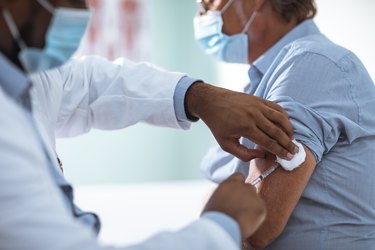
Now that doses of several COVID-19 vaccines are becoming more widely available across the country, you probably have a lot of questions about what happens when you're OK'd to get the shot.
Namely, if you've already had COVID-19 or had a positive COVID-19 antibody test, do you still need to get jabbed?
Video of the Day
Video of the Day
The Centers for Disease Control and Prevention (CDC) says yes, and health experts suggest you do, too — both for your health and the safety of others. Here's why.
Get tips on how to stay healthy, safe and sane during the novel coronavirus pandemic.
1. You Could Get Sick Again Without It
First, even if you've dubbed yourself a COVID survivor, you might still be able to get sick from the coronavirus again.
"Patients who have been infected with COVID-19 should still get the vaccine. We are not certain that a prior infection will lead to lifelong immunity. Current data suggests a prior infection could confer immunity for around six months," says Michelle Prickett, MD, an associate professor of medicine at Northwestern University Feinberg School of Medicine in Chicago and a Northwestern Medicine pulmonary and critical care specialist.
While not common, there have been confirmed cases of people who have gotten reinfected with COVID-19. One report on a young man from Nevada, described in The Lancet Infectious Diseases, noted the second infection was worse than the first, sending the patient to the hospital for oxygen.
So, even if you think you're comfortable with risking it because your brush with COVID wasn't that bad, that doesn't mean a future illness would be a walk in the park.
"One major purpose of vaccination is to protect people who can't get the vaccine."
2. The Pros Outweigh the Cons
Because we don't know how long natural immunity really lasts, Lisa Lee, PhD, research professor in the department of population health sciences at Virginia Tech, also recommends getting the vaccine even if you've had COVID-19 in the past, and stresses that it's safe to do so.
Lee explains that while vaccine trials didn't actively seek out and enroll people who had previously had COVID, some participants did actually have the infection before. (There were, after all, tens of thousands of people included.)
Because of that, "in terms of safety, it's not an issue to get vaccinated [after recovering from COVID-19], and it will certainly help prevent a person from becoming infected again," she says. (The Pfizer vaccine, for example, is 95 percent effective against symptomatic COVID.)
Typical side effects are similar to a flu vaccine, per the CDC: Your arm may get sore from the needle prick, and you might also get a fever or feel achy for a day or two after, a sign that your immune system is responding to the vaccine.
Here's the not-so-great news: Some early research shows that people who've had COVID tend to have a stronger reaction to the first shot of the Pfizer or Moderna vaccines. In a preprint study posted to medRxiv, researchers said these people reported fever, chills, fatigue, headache and body aches more often than people who had never been infected with the virus.
This doesn't mean the vaccine makes you sick, Lee explains, but that your immune system is basically saying it's ready to take on the virus.
On the bright side, though, COVID survivors also showed much higher antibody levels after both the first and second shots. We don't yet know exactly what that means for immunity, but having more antibodies to fight a deadly virus seems like it could only be a good thing.
Tip
If you have a question or concerns related to the vaccine and your particular heath condition, Lee recommends starting a conversation with a health provider you trust. “They know most about your specific health history and are best suited to give you advice,” she says.
3. Getting It Can Help Keep Others Safe
Important, too, is that by getting a vaccine, you're helping save others.
As of October 2020, less than 10 percent of the world population had been infected with COVID-19, according to the World Health Organization. In other words? There are still so many people who could get severely ill and possibly die from the disease.
"One major purpose of vaccination is to protect people who can't get the vaccine," Lee says.
If enough people get vaccinated, this creates herd immunity, which is community protection. (The CDC has not predicted how much of the U.S. population will have to get vaccinated in order to achieve herd immunity, but experts predict it's somewhere between 50 and 80 percent, per the Cleveland Clinic.)
"If the herd can't get the infection, they can't pass it along to vulnerable people," Lee says. "Essentially, herd immunity creates a sort of [protective] donut around the vulnerable, where the infection can't penetrate and get to them."
Related Reading
Read more stories to help you navigate the novel coronavirus pandemic:
- Centers for Disease Control and Prevention: “Frequently Asked Questions about COVID-19 Vaccination”
- The Lancet Infectious Diseases: “What reinfections mean for COVID-19”
- World Health Organization: “Coronavirus disease (COVID-19): Herd immunity, lockdowns and COVID-19”
- Centers for Disease Control and Prevention: “Grading of Recommendations, Assessment, Development, and Evaluation (GRADE): Pfizer-BioNTech COVID-19 Vaccine”
- Centers for Disease Control and Prevention: "Possible Side Effects After Getting a COVID-19 Vaccine"
- medRxiv: "Robust spike antibody responses and increased reactogenicity in seropositive individuals after a single dose of SARS-CoV-2 mRNA vaccine"
- Cleveland Clinic: "How Much of the Population Will Need to Be Vaccinated Until the Pandemic Is Over?"
Is this an emergency? If you are experiencing serious medical symptoms, please see the National Library of Medicine’s list of signs you need emergency medical attention or call 911.